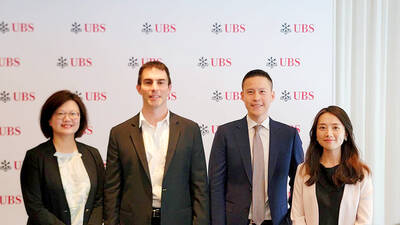Taiwan Cement Corp (台灣水泥) yesterday said that production capacity at its facilities in China is currently fully utilized on the back of increasing market demand.
Demand for cement has increased as workers return to construction sites across China following the Lunar New Year holiday, the company said.
Taiwan Cement said that judging from past market records, construction projects in China usually pick up speed in March after the Lunar New Year holiday, which usually falls in late January or early February.
A recent product price recovery also shows a tighter supply of cement in China, Taiwan Cement said, adding that the price rebound is expected to continue.
Currently, the company operates a broad production base in several Chinese provinces, including Guangdong, Guangxi, Anhui, Fujian and Jiangsu.
Although China has introduced a 20 percent capital gains tax and higher down payments for second-home buyers to curb skyrocketing housing prices, its policy of continuing to supply housing to mid and low-income households is expected to lend support to the domestic property market and lead to higher cement demand, the company said.
In addition, the Chinese government is expected to launch more infrastructure projects later this year to further lift the economy and pave the way for increased cement purchases, Taiwan Cement said.
The company said cement consumption in China is expected to rise by between 5.6 percent and 6.0 percent this year from a year earlier to between 2.28 billion tonnes and 2.3 billion tonnes.
Market analysts said that due to rising demand in China, Taiwan Cement’s China-based subsidiary, TCC International Holdings Ltd (台泥國際集團), would see an improvement in its bottom line this year.
Last month, TCC International, which is listed on the Hong Kong stock exchange, issued a profit warning, saying that it could have suffered a profit drop of about 60 percent last year following a glut in supply and falling product prices.

TECH TITAN: Pandemic-era demand for semiconductors turbocharged the nation’s GDP per capita to surpass South Korea’s, but it still remains half that of Singapore Taiwan is set to surpass South Korea this year in terms of wealth for the first time in more than two decades, marking a shift in Asia’s economic ranks made possible by the ascent of Taiwan Semiconductor Manufacturing Co (TSMC, 台積電). According to the latest forecasts released on Thursday by the central bank, Taiwan’s GDP is expected to expand 4.55 percent this year, a further upward revision from the 4.45 percent estimate made by the statistics bureau last month. The growth trajectory puts Taiwan on track to exceed South Korea’s GDP per capita — a key measure of living standards — a

Samsung Electronics Co shares jumped 4.47 percent yesterday after reports it has won approval from Nvidia Corp for the use of advanced high-bandwidth memory (HBM) chips, which marks a breakthrough for the South Korean technology leader. The stock closed at 83,500 won in Seoul, the highest since July 31 last year. Yesterday’s gain comes after local media, including the Korea Economic Daily, reported that Samsung’s 12-layer HBM3E product recently passed Nvidia’s qualification tests. That clears the components for use in the artificial intelligence (AI) accelerators essential to the training of AI models from ChatGPT to DeepSeek (深度求索), and finally allows Samsung

READY TO HELP: Should TSMC require assistance, the government would fully cooperate in helping to speed up the establishment of the Chiayi plant, an official said Taiwan Semiconductor Manufacturing Co (TSMC, 台積電) yesterday said its investment plans in Taiwan are “unchanged” amid speculation that the chipmaker might have suspended construction work on its second chip packaging plant in Chiayi County and plans to move equipment arranged for the plant to the US. The Chinese-language Economic Daily News reported earlier yesterday that TSMC had halted the construction of the chip packaging plant, which was scheduled to be completed next year and begin mass production in 2028. TSMC did not directly address whether construction of the plant had halted, but said its investment plans in Taiwan remain “unchanged.” The chipmaker started

LOOKING BRIGHT: Taiwanese tech stocks have been trading at 18 to 19 times earnings, beating the 15 percent long-term average amid AI-driven optimism, an analyst said Taiwan’s economy could expand by as much as 5 percent this year, fueled by its technology manufacturing edge amid a global artificial intelligence (AI) boom, while tariff exemptions on semiconductor products keep the country’s levy burden low despite a headline rate of 20 percent, UBS Investment Bank said yesterday. “Although Washington has imposed a 20 percent tariff on goods from Taiwan, exemptions for semiconductors keep the weighted average low,” UBS senior economist for Asia and China William Deng (鄧維慎) said. The growth momentum is expected to extend into next year, with technology companies’ revenue projected to rise 17 percent, UBS research head